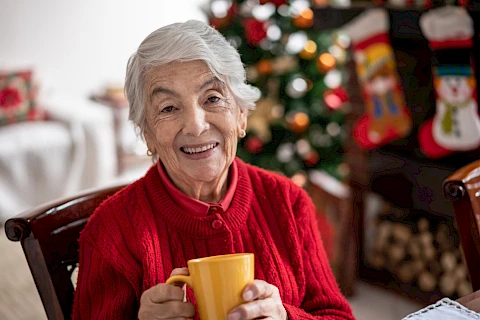
As winter approaches, caregivers must take extra precautions to keep seniors safe and comfortable. Cold weather brings specific challenges, from maintaining warmth to ensuring safety inside and outside the home. A well-prepared caregiver can make all the difference in preventing accidents and health issues during these chilly months. This checklist from Senior Helpers of Portage/Geauga will help ensure the seniors in your care are safe and cozy this winter.
Heating and Ventilation
Cold temperatures can lead to health issues like hypothermia, so ensuring the heating system is in top working order is essential. Start by inspecting and servicing the furnace before the cold fully sets in. If space heaters are in use, ensure they're far from flammable objects and never left unattended. Space heaters should have automatic shut-off features as an additional safety measure. Fireplaces, too, need to be inspected and cleaned to prevent chimney fires and ensure efficient burning.
Ventilation is equally important, particularly to prevent the buildup of carbon monoxide. Ensure working carbon monoxide detectors are installed near sleeping areas, and check their batteries regularly. Proper ventilation will keep indoor air fresh, which is especially important when the windows are closed for months at a time.
Lighting and Visibility
Shorter daylight hours in winter mean less natural light, which can lead to visibility issues. It's essential to keep the home well-lit to prevent accidents. Consider adding brighter bulbs where needed and ensure nightlights are in place, particularly in hallways and bathrooms. Task lighting in kitchens and areas where seniors spend a lot of time will also make daily activities safer.
Outdoor lighting prevents falls when it's dark outside. Ensure pathways and entryways are well-lit, using motion-sensor lights when possible to save energy and provide immediate illumination in these areas.
Fall Prevention
Winter conditions bring unique challenges for preventing falls. Wet or icy walkways can be hazardous, so keep paths clear of snow and ice, using salt or sand to enhance traction. Indoors, remove rugs and mats to prevent slipping. Regularly check that shoes fit well and have non-slip soles. If the senior uses a walking aid, ensure it is in good condition and suitable for slippery conditions, such as adding ice tips for canes.
Emergency Preparedness
Being prepared for emergencies is essential during winter. Start by discussing an emergency plan that covers who to contact and where to go in case of severe weather or power outages. Stock up on supplies such as food, water, and medications that can last several days. Keep a list of emergency contact numbers in an easily accessible place.
In anticipation of power outages, ensure a supply of flashlights, batteries, and blankets is on hand. A solar or battery-powered phone charger can keep communication lines open if the power is out for an extended period.
Get Senior Homes Ready for Winter
By implementing these simple steps, caregivers can provide peace of mind and help prevent accidents and health issues associated with winter's harsh conditions. Preparedness and attention to detail make all the difference in supporting a warm and secure environment.
For personalized senior care and assistance in Aurora, Chagrin Falls, Chesterland, Hudson, and Ravenna, contact us at Senior Helpers of Portage/Geauga today. Our team is ready to ensure your loved one's safety and comfort this winter.